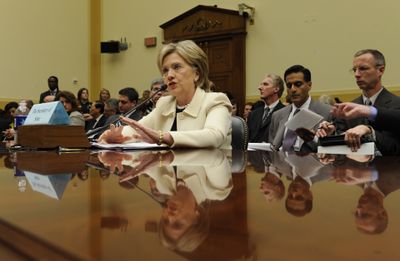Clinton sounds alarm over threat to Pakistan

WASHINGTON – In an assessment that raised questions about the future of Pakistan, Secretary of State Hillary Clinton warned Wednesday that the country’s fragile government was facing an “existential threat” from militants operating near its capital.
Clinton told the House Foreign Affairs Committee that the government of Islamabad was ceding more and more territory to militants and was “basically abdicating to the Taliban and the extremists” in signing a deal that would limit the government’s involvement in the war-torn Swat Valley.
“I think we cannot underscore (enough) the seriousness of the existential threat posed to the state of Pakistan by the continuing advances,” Clinton said, adding that an unstable and nuclear-armed Pakistan also would pose a “mortal threat” to the United States and other countries.
The unusually bleak warning came as militants expanded into new territory adjacent to the Swat Valley, where they intend to impose sharia law.
President Barack Obama’s administration has been trying to implement a new stabilization strategy for the region. U.S. Adm. Michael Mullen, chairman of the Joint Chiefs of Staff, arrived in Pakistan on Wednesday for meetings following a visit earlier this month with U.S. envoy Richard C. Holbrooke.
The concerns Clinton expressed Wednesday were echoed by Rep. Howard L. Berman, D-Calif., chairman of the House committee, who said he was alarmed by predictions “that Pakistan could collapse in as little as six months.”
U.S. officials also are worried about other developments, such as a recent decision by the Pakistani supreme court to release Maulana Abdul Aziz, an anti-American cleric who is accused of ties to violent terrorists.
Clinton called on Pakistanis, Pakistani-Americans and others in the diaspora to “speak out forcefully” to change attitudes in the Pakistani government.